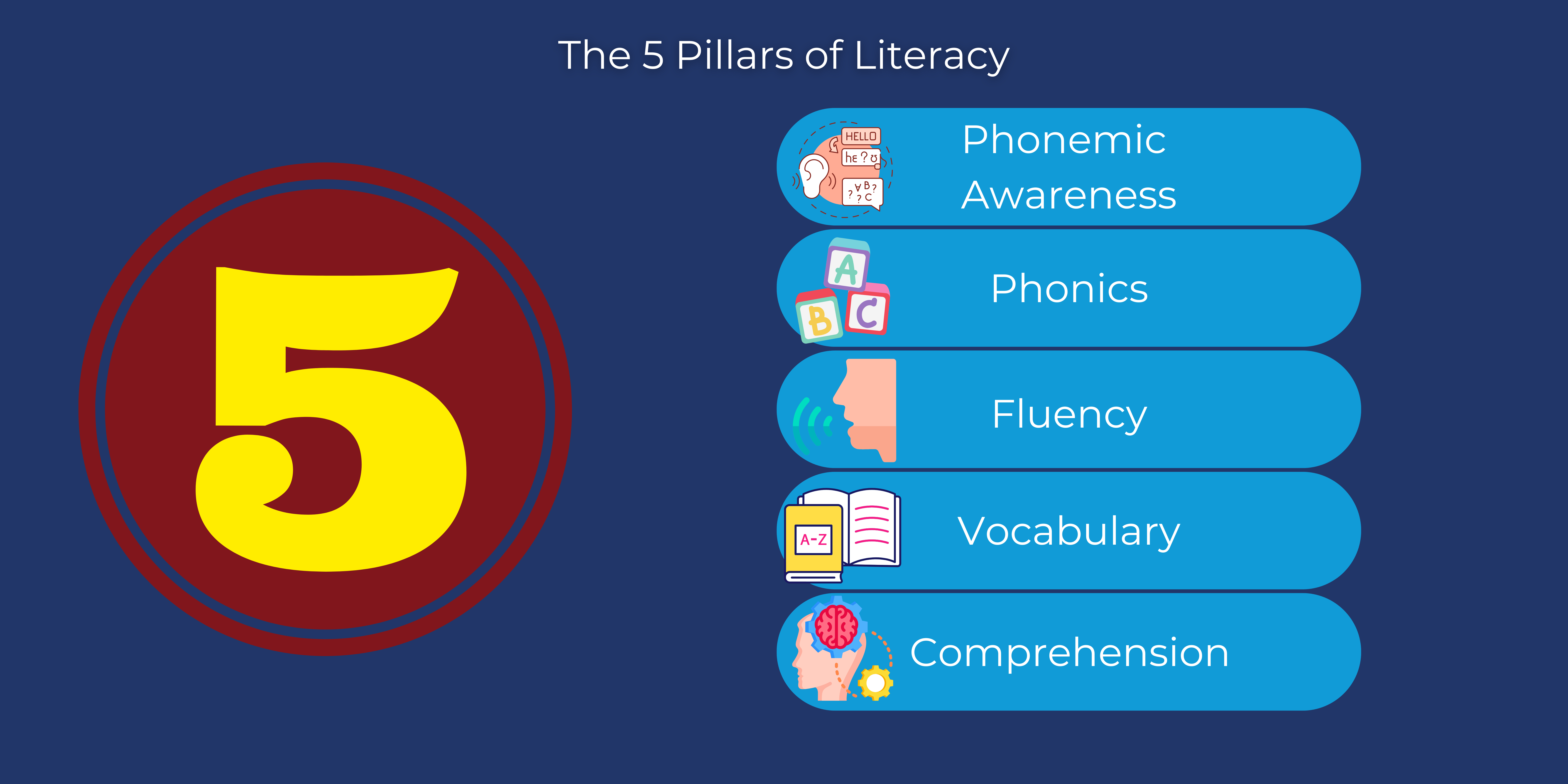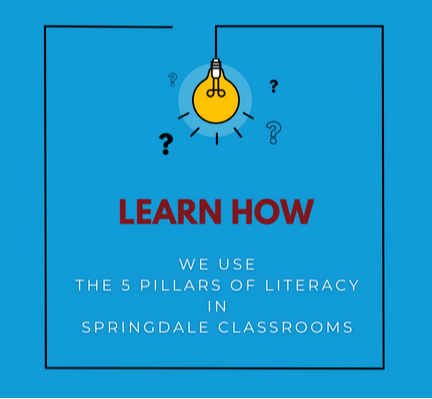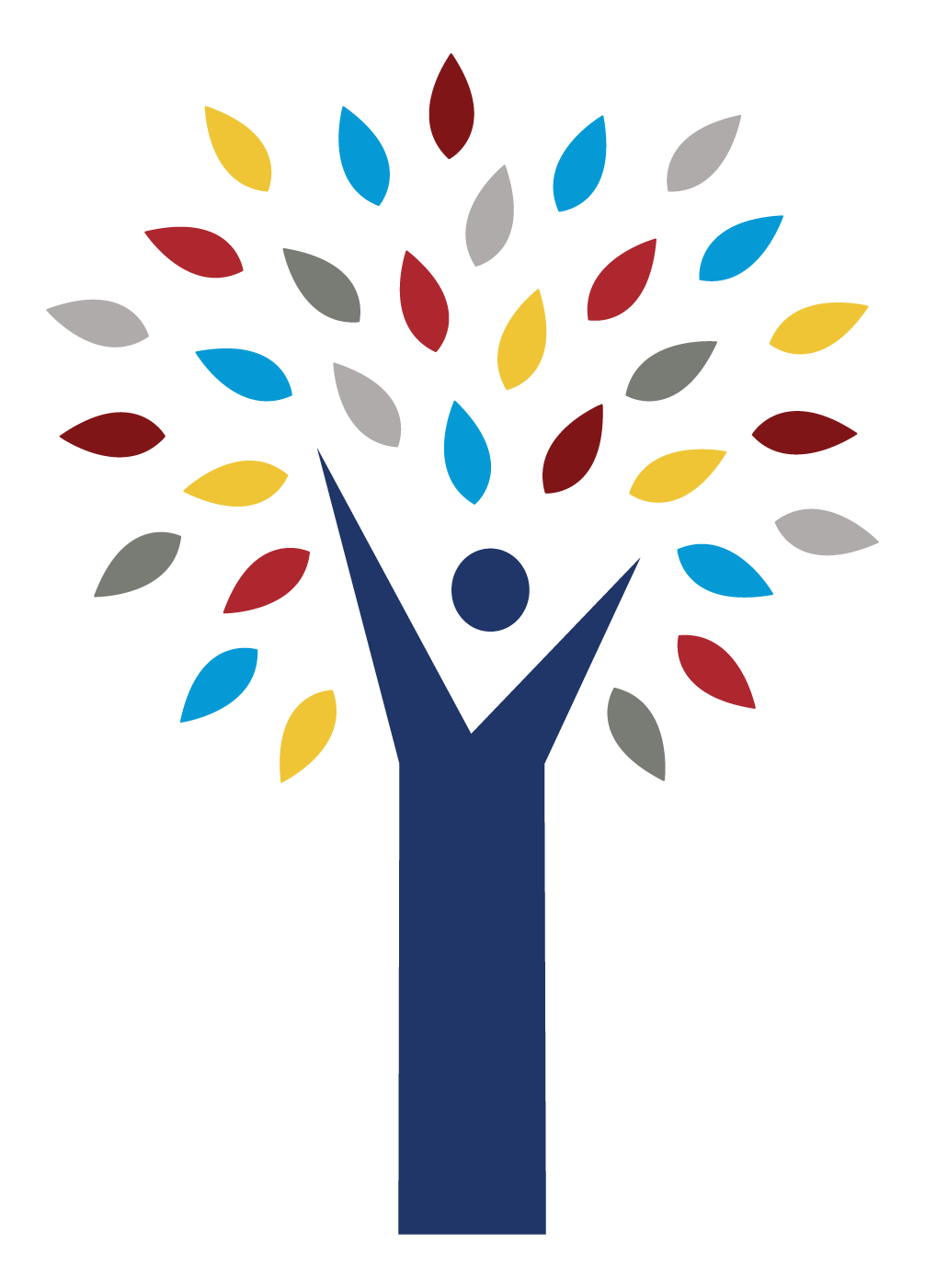
COLLECTIVE ADVOCACY FOR
K-3 LITERACY
DEDICATION TO LITERACY
The Springdale Public School District is dedicated to literacy through investments in our teachers, parent collaboration, and community partnerships. Our district's number one Big Audacious Goal is for each child to be on or above grade level in reading every year as measured by the state summative assessment. This page provides accessible information to parents concerning the benefits of our literacy program and how they can get involved in their child's literacy development.
THE 5 PILLARS
Literacy In The Classroom


Pillar 1
Phonemic Awareness
Phonemic awareness is the ability to identify, articulate, and manipulate the individual sounds in words. This important skill helps students read and write.
Pillar 2
Phonics
Phonics is the knowledge of sounds in spoken language and the letters that represent those sounds. This knowledge enables students to read and write with fluency.
Pillar 3
Fluency
Fluent readers are able to read orally with speed, accuracy, and proper expression.
Pillar 4
Vocabulary
The knowledge of spoken and written words. The larger the student's vocabulary, the easier it is to make sense of text.
Pillar 5
Comprehension
Comprehension is a process where students construct meaning and process information whether it is spoken or written.
Phonics First
Classroom and Tier 1 Phonics
The Springdale School district proudly implements the Phonics First - Classroom Tier 1, Component Specific Core Program, published by Brainspring, designed to teach phonics skills to students.

PARENT PARTNERSHIP
Home Reading Tips
Elizabeth Dederich, a literacy instructional specialist with Springdale Public Schools, shares several tips on how to help your child daily with literacy!
Pair Reading
Reading with Your Child
Reading to your child can build interest in reading and strengthen reading comprehension.
Listening to your child read can build reading fluency.
Talk about your reading, focusing on new vocabulary words, interesting facts or events in the story, and any questions or curiosities that arise.
Irregular Words
Irregular (red words) are words that are not spelled phonetically; there is something irregular about the sound to spelling connection.
Home Literacy Tips
for Parents
Have conversations before, during, and after reading together (even after watching a film/TV Program). Use open-ended questions to ask your child to think about the book’s/video messages and what is happening.
Build vocabulary and oral language through lots of family talk (in all languages). Discuss and talk about everyday activities such as cooking, shopping, playing, and reading to your child — pointing out new words and then using them in conversations.
Expand background knowledge through shared experiences in the community. Visit local museums, cultural centers, sporting events, and other activities to expand students' experiences.
Consejos para los Padres sobre Educación en el Hogar
Tengan conversaciones antes, durante y después de leer juntos (incluso después de ver una película o un programa de televisión). Utilice preguntas abiertas para pedirle a su hijo que piense en los mensajes del libro/video y en lo que está sucediendo.
Desarrollen vocabulario y lenguaje oral a través de muchas conversaciones familiares (en todos los idiomas). Hable con su hijo sobre actividades cotidianas como cocinar, comprar, jugar y leer, señalándole nuevas palabras y luego utilizándolas en las conversaciones.
Amplíen el conocimiento adquirido a través de experiencias compartidas en la comunidad. Visiten museos locales, centros culturales, eventos deportivos y otras actividades para expandir las experiencias de los estudiantes.
Home Literacy Tip ko nan Jinen im Jemen Rijikuul ro
Bwebwenato ippan droon mokta jen, ilo ien konono ippan droon, im alkin aer riit ippan droon (emaron bar alkin aloje pija ko/TV Burokraam ko). Kojerbal open-ended kajjitok ko book ko/video message ko im ta ko rej kommani im kajitikin ajiri eo najim bwe en lomnak kin book ko/video message ko im ta ko rej walok.
Kolaplok vocabulary im oral language ilo am konono ippan paamle eo am (ilo aolep kajin ko). Konono ippan droon im kenaan ken makitkit ko rej bok jikier ilo aolep raan ainwot komat, wia, ikkure im riit nan ajiri eo najim — jitone naan ko rekaal im lak moj kojerbali ilo am bwebwenato ippan droon.
Kolaplok background knowledge ilo am naaj share e experience ko am ilo kaamuniti eo. Lolok local museum ko, cultural center ko, sporting event ko, im makitkit ko jet bwe en laplok experience ko an rijikuul eo.
Recommended Resources for Parents

COMMUNITY PARTNERS
Rotary Club
The Rotary Club Springdale, Arkansas, is an organization of business and professional leaders who lead in humanitarian causes. They boost literacy in Springdale Schools with their multiple book donations.
SOAR Program
Filling the gap between the school day and the workday, SOAR provides a safe and affordable place for kids to learn, build healthy relationships with peers and adults, and practice the public speaking and leadership skills they'll need for future success.
Springdale Public Library
The Springdale Public Library is an essential literary partner providing numerous services to the Springdale Community!
Business Grants
Walmart and Kellogg’s partnered March 15 to donate 500 books to Shaw Elementary School classroom libraries.
The books were donated as part of W.K. Kellogg’s Feeding Happiness initiative.
Kiwanis Club
The Springdale Kiwanis supports the Springdale School District children by providing books to young readers.
For more information on Springdale Kiwanis and how you can get involved, email them at: info@springdalearkiwanis.org Or visit: https://springdalearkiwanis.org/
Family Literacy Program
The Springdale Family Literacy Program (SFLP) creates the opportunity for parents to spend time in the classroom with their children, engaging with class materials and empowering parents with essential English language skills.
Sessions are held twice a week in 8 elementary schools in the Springdale School District.
Our proud partnership with North West Technical Institute ensures adult English instruction available at each site.

INVESTMENT IN PROFESSIONAL LEARNING
Assistant Principal Sonia Hernandez tells us about the literacy training at George Elementary!
Associate Superintendent, Melissa Fink, shares how best teaching strategies are shared among teachers.
Professional Learning Communities (PLC) and Collaborative Team Meetings (CTM)
Springdale Public Schools is committed to Professional Learning Communities (PLC) by participating in weekly Collaborative Team Meetings (CTM) in which educators work collaboratively in recurring cycles of collective inquiry and action research to achieve better results for the students they serve.
Our early out Wednesday CTM’s focus on improved student learning through continuous job-embedded learning for educators, student-level data analysis, and collaborative planning for student support.
Proficiency
in the Science of Reading
Act 1063 of 2017, the Right to Read Act, as amended by Act 489 of 2021, states:
“By the beginning of the 2023-2024 school year: All teachers employed in a teaching position that requires an elementary education (K-6) license or special education (K-12) license shall demonstrate proficiency in knowledge and practices of scientific reading instruction. "
Springdale Public Schools has provided multiple state-approved pathways for teachers to gain knowledge and practices in scientific reading instruction and then demonstrate knowledge and practices in scientific reading instruction through observations.
Phonics First
Tier One Instruction
Phonics First is a structured literacy program on the Division of Elementary and Secondary Education (DESA)-approved literacy curriculum list published by Brainspring, designed to teach phonics skills to students.
It focuses on teaching students the relationship between sounds and the letters representing them. It supports students to become fluent readers and writers by creating a strong foundation in phonemic awareness, phonics, spelling, and reading fluency.
Every certified teacher undergoes 30 hours of training to be certified to teach with depth of knowledge of the building blocks of proficient readers.
